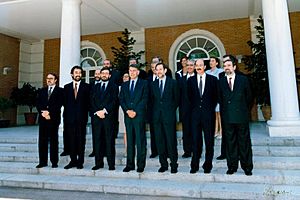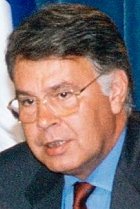Fourth government of Felipe González facts for kids
Quick facts for kids 4th government of Felipe González |
|
|---|---|
Government of Spain |
|
| 1993–1996 | |

The government in July 1993.
|
|
| Date formed | 14 July 1993 |
| Date dissolved | 6 May 1996 |
| People and organisations | |
| Monarch | Juan Carlos I |
| Prime Minister | Felipe González |
| Deputy Prime Minister | Narcís Serra (1993–1995) |
| No. of ministers | 17 (1993–1994) 16 (1994–1995) 15 (1995–1996) |
| Total no. of members | 21 |
| Member party | PSOE |
| Status in legislature | Minority government |
| Opposition party | PP |
| Opposition leader | José María Aznar |
| History | |
| Election(s) | 1993 general election |
| Outgoing election | 1996 general election |
| Legislature term(s) | 5th Cortes Generales |
| Budget(s) | 1994, 1995 |
| Predecessor | González III |
| Successor | Aznar I |
The fourth government of Felipe González was formed on 14 July 1993. This happened after he was chosen as the Prime Minister of Spain by the Congress of Deputies (Spain's main parliament). His party, the Spanish Socialist Workers' Party (PSOE), won the most votes in the 1993 Spanish general election.
This government followed González's third one. It was in charge of Spain from 14 July 1993, until 6 May 1996. That's about two years and ten months!
González's fourth government was quite different from his previous ones. Only five ministers stayed in the same job. Four ministers moved to new jobs, and eight new people joined the government. It was also known for having many people who were not part of a political party (called independent figures). Plus, it had the most women ministers ever for a González government, including Carmen Alborch, Ángeles Amador, and Cristina Alberdi. Narcís Serra remained the only Deputy Prime Minister, and he gained more power over economic matters.
The government faced a big challenge when its plan for the 1996 national budget was rejected by parliament on 25 October 1995. This meant the government was in trouble. They had to use the old 1995 budget and eventually decided to hold a snap election (an early election). The government officially ended on 4 March 1996, after the 1996 Spanish general election. However, they continued to manage things until the next government took over.
Contents
Choosing the Prime Minister
After the 1993 general election, Felipe González needed to be officially chosen as Prime Minister by the Congress of Deputies. This process is called an investiture vote. To be chosen, he needed more than half of the votes from the 350 members of parliament.
On 9 July 1993, González received enough votes to become Prime Minister. His own party, the PSOE, voted for him. He also got support from other parties like CiU and the PNV. This allowed him to form his fourth government.
Changes in the Government Team
During its time, González's fourth government had several changes in its ministers. Here are some of the most important ones:
First Changes in 1993
- On 18 November 1993, José Luis Corcuera, the Minister of the Interior, decided to resign. This happened after a court ruled that parts of a law he had introduced (the "Corcuera Law") were against the constitution. This law had allowed police to enter private homes without a judge's permission in some cases. His resignation was accepted on 24 November, and Antoni Asunción took his place the next day.
Changes in 1994
- On 6 May 1994, two ministers resigned. Antoni Asunción, the Minister of the Interior, stepped down on 30 April. This was because a former head of the Civil Guard (a police force), Luis Roldán, had run away from Spain. Roldán was suspected of stealing money, and the Interior Ministry was responsible for keeping an eye on him.
- At the same time, Vicente Albero, the Minister of Agriculture, resigned on 4 May. He was involved in a tax issue.
- As a result, Juan Alberto Belloch became the new Minister of Justice and Interior. The two ministries (Justice and Interior) were combined into one. Luis María Atienza became the new Minister of Agriculture, Fisheries and Food.
Major Changes in 1995
- On 12 June 1995, a big scandal came to light. It was discovered that Spain's main intelligence agency, CESID, had been secretly recording phone calls of many important people. This included politicians, business leaders, journalists, and even the King. It seemed the government didn't know about it.
- This scandal led to the resignations of Julián García Vargas, the Minister of Defence (who was in charge of CESID), and Narcís Serra, the Deputy Prime Minister (who had been Defence Minister before).
- Prime Minister González accepted their resignations on 28 June 1995. Gustavo Suárez Pertierra, who was the Minister of Education, became the new Minister of Defence. Joan Lerma joined the government as the Minister for Public Administrations, replacing Jerónimo Saavedra. Saavedra then took over Suárez Pertierra's old job as Minister of Education. No one was appointed to replace Narcís Serra as Deputy Prime Minister, so that position remained empty.
Final Change in 1995
- On 19 December 1995, Javier Solana, the Minister of Foreign Affairs, left the government. He was chosen to become the new Secretary General of NATO, a very important international organization. Carlos Westendorp took his place as Minister of Foreign Affairs.
Ministers of the Government
The government was made up of the Prime Minister, the Deputy Prime Minister, and several ministers leading different departments. In 1994, the number of ministries was reduced from 16 to 15 when the Justice and Interior ministries were combined. The Deputy Prime Minister's job was left empty from 1995 onwards.
| ← González IV Government → (14 July 1993 – 6 May 1996) |
||||||
| Portfolio | Name | Party | Took office | Left office | Ref. | |
|---|---|---|---|---|---|---|
| Prime Minister | Felipe González | PSOE | 13 July 1993 | 5 May 1996 | ||
| Deputy Prime Minister | Narcís Serra | PSC–PSOE | 14 July 1993 | 2 July 1995 | ||
| Minister of Foreign Affairs | Javier Solana | PSOE | 14 July 1993 | 19 December 1995 | ||
| Minister of Justice | Juan Alberto Belloch | Independent | 14 July 1993 | 6 May 1994 | ||
| Minister of Defence | Julián García Vargas | PSOE | 14 July 1993 | 2 July 1995 | ||
| Minister of Economy and Finance | Pedro Solbes | Independent | 14 July 1993 | 6 May 1996 | ||
| Minister of the Interior | José Luis Corcuera | PSOE | 14 July 1993 | 24 November 1993 | ||
| Minister of Public Works, Transport and Environment | Josep Borrell | PSOE | 14 July 1993 | 6 May 1996 | ||
| Minister of Education and Science | Gustavo Suárez Pertierra | PSOE | 14 July 1993 | 3 July 1995 | ||
| Minister of Labour and Social Security | José Antonio Griñán | PSOE | 14 July 1993 | 6 May 1996 | ||
| Minister of Industry and Energy | Juan Manuel Eguiagaray | PSOE | 14 July 1993 | 6 May 1996 | ||
| Minister of Agriculture, Fisheries and Food | Vicente Albero | PSOE | 14 July 1993 | 4 May 1994 | ||
| Minister of the Presidency Spokesperson of the Government |
Alfredo Pérez Rubalcaba | PSOE | 14 July 1993 | 6 May 1996 | ||
| Minister for Public Administrations | Jerónimo Saavedra | PSOE | 14 July 1993 | 3 July 1995 | ||
| Minister of Culture | Carmen Alborch | Independent | 14 July 1993 | 6 May 1996 | ||
| Minister of Health and Consumer Affairs | Ángeles Amador | Independent | 14 July 1993 | 6 May 1996 | ||
| Minister of Social Affairs | Cristina Alberdi | Indep./PSOE | 14 July 1993 | 6 May 1996 | ||
| Minister of Trade and Tourism | Javier Gómez-Navarro | Independent | 14 July 1993 | 6 May 1996 | ||
Ministers After November 1993 Changes |
||||||
| Portfolio | Name | Party | Took office | Left office | Ref. | |
| Minister of the Interior | Antoni Asunción | PSOE | 25 November 1993 | 4 May 1994 | ||
Ministers After May 1994 Changes |
||||||
| Portfolio | Name | Party | Took office | Left office | Ref. | |
| Minister of Justice and Interior | Juan Alberto Belloch | Independent | 6 May 1994 | 6 May 1996 | ||
| This ministry was closed on 6 May 1994. | ||||||
| Minister of Agriculture, Fisheries and Food | Luis María Atienza | PSOE | 6 May 1994 | 6 May 1996 | ||
Ministers After July 1995 Changes |
||||||
| Portfolio | Name | Party | Took office | Left office | Ref. | |
| Deputy Prime Minister | This position was empty from 2 July 1995. | |||||
| Minister of Defence | Gustavo Suárez Pertierra | PSOE | 3 July 1995 | 6 May 1996 | ||
| Minister of Education and Science | Jerónimo Saavedra | PSOE | 3 July 1995 | 6 May 1996 | ||
| Minister for Public Administrations | Joan Lerma | PSOE | 3 July 1995 | 6 May 1996 | ||
Ministers After December 1995 Changes |
||||||
| Portfolio | Name | Party | Took office | Left office | Ref. | |
| Minister of Foreign Affairs | Carlos Westendorp | PSOE | 19 December 1995 | 6 May 1996 | ||
Images for kids
-
Narcís Serra, Deputy Prime Minister.
-
Javier Solana, Minister of Foreign Affairs.
-
Juan Alberto Belloch, Minister of Justice and Interior.
-
Julián García Vargas, Minister of Defence.
-
Pedro Solbes, Minister of Economy and Finance.
-
Josep Borrell, Minister of Public Works, Transport and Environment.
-
Juan Manuel Eguiagaray, Minister of Industry and Energy.
-
Vicente Albero, Minister of Agriculture, Fisheries and Food.
-
Luis María Atienza, Minister of Agriculture, Fisheries and Food.
-
Alfredo Pérez Rubalcaba, Minister of the Presidency and Government Spokesperson.
-
Joan Lerma, Minister for Public Administrations.
-
Carmen Alborch, Minister of Culture.
-
Ángeles Amador, Minister of Health and Consumer Affairs.
-
Cristina Alberdi, Minister of Social Affairs.
-
Carlos Westendorp, Minister of Foreign Affairs.
See also
 In Spanish: Cuarto Gobierno González para niños
In Spanish: Cuarto Gobierno González para niños
 | Delilah Pierce |
 | Gordon Parks |
 | Augusta Savage |
 | Charles Ethan Porter |
























